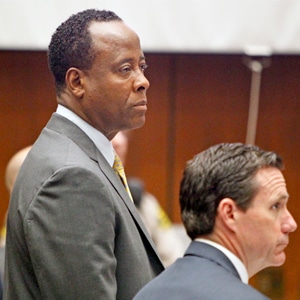 Al Seib-Pool/Getty Images
Al Seib-Pool/Getty ImagesAnother day in court, "another day of sadness," according to avid tweeter, La Toya Jackson.
The usual suspects returned Wednesday as prosecutors continued to make their case against Dr. Conrad Murray, who's charged with involuntary manslaughter in the June 25, 2009, death of Michael Jackson.
First up, the two sides finished questioning AEG Live exec Paul Gongaware, and he was followed on the stand by AEG lawyer Kathy Jorrie. Before the lunch break, testimony was heard from former Jackson assistant Michael Amir Williams. Security guard Faheem Muhammad took the stand in the afternoon session.
But because real-life proceedings are never as fraught with tension as Law & Order would have you believe, we've plucked the main points from today's testimony:
1. Pure Pandemonium: The scene at Michael Jackson's bedside (or the floor where Murray instructed Jackson staffers to place their unconscious boss) sounds like one for the sad, disturbing books. Williams, the former personal assistant, testified that he received a frantic voicemail message—which was played in court—from Murray on that day saying, "Call me right away, please, call me right away, thank you." When he called back a few minutes later, Murray said, "Get here right away. Mr. Jackson had a bad reaction. Get someone up here right away."
Yet he never asked Williams to call 911, the assistant said. Williams testified that, after Jackson was pronounced dead, Murray asked him to drive him back to the house to retrieve a cream "he wouldn't want the world to know about." Williams found that suspicious, so he made up an excuse and then alerted security back at the house not to let Murray in.
Muhammad stated that Murray, who asked those gathered if anyone knew CPR, was "nervous and sweaty." Bodyguard Alberto Alvarez, who's also expected to take the stand at some point, stepped forward to help with the CPR.
Meanwhile, Muhammad testified, Jackson's two older children, Prince Michael and Paris had come into the room and both were crying. Paris, after seeing her father, was "on the ground balled up, crying," he recalled. A nanny soon ushered them out of the room.
2. Code Blue: AEG attorney Kathy Jorrie testified that Murray, while negotiating his ultimately unsigned contract, asked them to provide him with a portable CPR machine—not to mention a second doctor to assist him—for Jackson in London, saying he didn't want to take any chances based on how "strenuous" his concert performances were supposed to be. (Katherine Jackson has alleged in her wrongful death suit against AEG Live that the concert promoter was supposed to provide Murray with lifesaving equipment for her son, but did not.)
Jorrie said, "Dr. Murray told me repeatedly that Michael Jackson was 'perfectly healthy, in excellent condition, don't worry about it, he's great.'"So, does that mean Murray knew Jackson was in bad shape and only exacerbated his problems in the end, or did he really think Jackson was fine and was just being thorough?
3. Green-Eyed Monster: Either way, Murray wanted major compensation for his services. Gongaware testified that Murray, who later agreed to a $150,000 monthly salary, originally wanted $5 million. Ten days before Jackson died, Murray was still asking for "a number of revisions" while she was drafting his contract, Jorrie said.
More tomorrow, bright and early.
E! Online will be streaming live from the courtroom Thursday starting at 8:45 a.m. PT